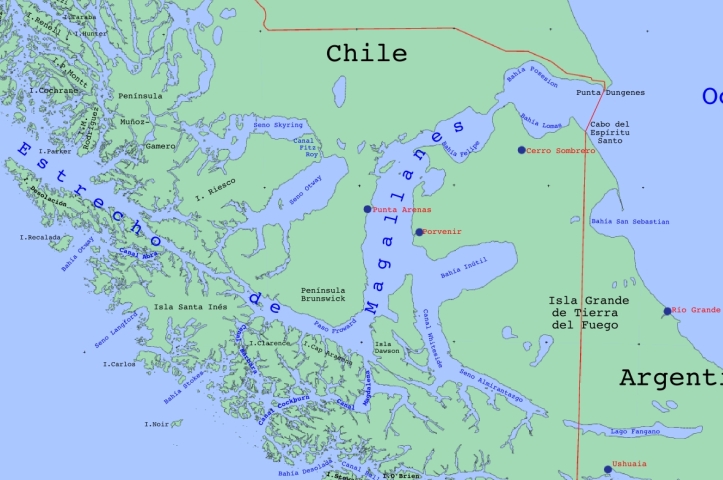Há 493 anos a expedição comandada por Fernão de Magalhães chegava ao Oceano Pacífico depois de atravessar o estreito que viria a ficar conhecido pelo seu nome, ligando pela primeira os oceanos Atlântico e Pacífico. O orgulho do feito histórico dá lugar a desconforto quando se sabe um pouco mais acerca dos factos históricos da épica expedição do século XVI.
_______________
"'Wednesday, November 28, 1520, we debouched from that strait, engulfing ourselves in the Pacific sea,' noted Pigafetta with quiet satisfaction. (...) For Magellan and his crew, it had been a remarkable rite of passage. As they sailed beyond the strait into the open water, how could they doubt that their expedition was indeed blessed by the Almighty? Although Magellan and his crew appeared vulnerable to the elements, to starvation, to the local tribes they encountered, and most of all to each other, this was not how they saw themselves. They all believed that a supernatural power looked after them and conferred on them the unique status of global travelers. (...) Magellan's skill in negotiating the entire length of the strait is acknowledged as the single greatest feat in the history of maritime exploration. It was, perhaps, an even greater accomplishment than Columbus's discovery of the New World, because the Genoan, thinking he had arrived in China, remained befuddled to the end of his days about where he was, and what he had accomplished, and as a result misled others. Magellan, in contrast, realized exactly what he had done; he had, at long last, begun to correct Columbus's great navigational error."
Bergreen, Lawrence (2003). Over the Edge of the World (pp. 200-2).
_________________
"'Quarta-feira, 28 de Novembro de 1520, desembocámos do estreito entrando no mar pacífico' anotou Pigafetta com calma satisfação. (...) Para Magalhães e a sua tripulação tratava-se de um ritual de passagem. Ao navegarem para lá do estreito em mar aberto, como poderiam duvidar que a sua expedição era de facto abençoada pelo Deus omnipotente? Embora Magalhães e a sua tripulação fossem vulneráveis aos elementos, à fome, às tribos locais que encontravam, e acima de tudo a eles próprios, não era assim que se consideravam. Todos acreditavam que um poder sobrenatural os protegia e lhes conferia o estatuto único de viajantes globais. (...) A destreza de Magalhães no atravessar de todo o estreito é reconhecida como o maior feito na história de toda a exploração marítima. Foi talvez uma maior conquista que a descoberta de um Novo Mundo por Colombo, porque o Genovês, pensando que tinha chegado à China, manteve-se enganado até ao fim dos seus dias acerca de onde estava e do que tinha alcançado, tendo por isso induzido outros em erro. Por seu turno Magalhães sabia exactamente o que tinha conseguido; finalmente tinha começado a corrigir o enorme erro da navegação de Colombo."
_______________
"'Wednesday, November 28, 1520, we debouched from that strait, engulfing ourselves in the Pacific sea,' noted Pigafetta with quiet satisfaction. (...) For Magellan and his crew, it had been a remarkable rite of passage. As they sailed beyond the strait into the open water, how could they doubt that their expedition was indeed blessed by the Almighty? Although Magellan and his crew appeared vulnerable to the elements, to starvation, to the local tribes they encountered, and most of all to each other, this was not how they saw themselves. They all believed that a supernatural power looked after them and conferred on them the unique status of global travelers. (...) Magellan's skill in negotiating the entire length of the strait is acknowledged as the single greatest feat in the history of maritime exploration. It was, perhaps, an even greater accomplishment than Columbus's discovery of the New World, because the Genoan, thinking he had arrived in China, remained befuddled to the end of his days about where he was, and what he had accomplished, and as a result misled others. Magellan, in contrast, realized exactly what he had done; he had, at long last, begun to correct Columbus's great navigational error."
Bergreen, Lawrence (2003). Over the Edge of the World (pp. 200-2).
_________________
"'Quarta-feira, 28 de Novembro de 1520, desembocámos do estreito entrando no mar pacífico' anotou Pigafetta com calma satisfação. (...) Para Magalhães e a sua tripulação tratava-se de um ritual de passagem. Ao navegarem para lá do estreito em mar aberto, como poderiam duvidar que a sua expedição era de facto abençoada pelo Deus omnipotente? Embora Magalhães e a sua tripulação fossem vulneráveis aos elementos, à fome, às tribos locais que encontravam, e acima de tudo a eles próprios, não era assim que se consideravam. Todos acreditavam que um poder sobrenatural os protegia e lhes conferia o estatuto único de viajantes globais. (...) A destreza de Magalhães no atravessar de todo o estreito é reconhecida como o maior feito na história de toda a exploração marítima. Foi talvez uma maior conquista que a descoberta de um Novo Mundo por Colombo, porque o Genovês, pensando que tinha chegado à China, manteve-se enganado até ao fim dos seus dias acerca de onde estava e do que tinha alcançado, tendo por isso induzido outros em erro. Por seu turno Magalhães sabia exactamente o que tinha conseguido; finalmente tinha começado a corrigir o enorme erro da navegação de Colombo."

Sem comentários:
Enviar um comentário